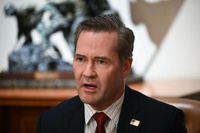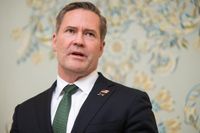In a startling revelation, Mike Waltz, Donald Trump’s national security adviser, exposed sensitive information through a public Venmo account that remained viewable until March 26, 2025. This oversight comes on the heels of a significant breach involving a Signal group chat where sensitive military plans were inadvertently shared with a journalist.
Waltz's Venmo account, listed under his name and featuring his photo, included a friends list of 328 individuals, comprising journalists, military personnel, and top government officials. Notably, the list featured White House Chief of Staff Susie Wiles and National Security Council staffer Walker Barrett, both of whom were also part of the controversial Signal chat that discussed U.S. military operations in Yemen.
According to a report by Wired, the public nature of Waltz's Venmo account posed a potential security risk, allowing foreign intelligence services or other malicious actors to exploit the information. The account was still public as late as March 25, 2025, just one day after the Atlantic reported on the Signal chat incident.
On March 24, 2025, the Atlantic revealed that Waltz had accidentally added Jeffrey Goldberg, the publication’s editor-in-chief, to a group chat where senior administration officials discussed plans for a military strike on Iranian-backed Houthi targets in Yemen. The chat, dubbed the "Houthi PC small group," included sensitive discussions about operational details, which were later released by Goldberg, raising concerns about national security.
After the Atlantic's report, Waltz and Wiles quickly changed their Venmo settings to private, reflecting a reactive approach to safeguarding their contacts. The list of contacts visible on Waltz's account included prominent media figures such as Bret Baier and Brian Kilmeade from Fox News, as well as CNN journalists Brianna Keilar and Kristen Holmes. This mix of high-profile associates further underscores the potential risks associated with public exposure on social media platforms.
Defense Secretary Pete Hegseth, who also participated in the Signal chat, faced backlash for sharing detailed information about the military strike, including timelines and types of weapons to be used. His Venmo account was previously public and revealed connections to various defense contractors and political figures.
In a separate incident, the German magazine Der Spiegel reported that private contact details for Waltz, Hegseth, and other senior officials had been leaked online, further complicating the national security landscape. The leaked information included personal phone numbers and email addresses that could be used maliciously.
Waltz has publicly taken responsibility for the breach, contradicting Trump's assertion that a "lower-level" staffer was to blame. He stated, “We have some of the best technology minds looking at how this happened,” indicating an awareness of the gravity of the situation.
As the fallout from these incidents continues, national security experts have raised alarms about the implications of such breaches. The public exposure of personal and professional networks through platforms like Venmo not only threatens individual privacy but also poses broader risks to national security. Experts warn that foreign adversaries could use this kind of information to build profiles of influential figures and potentially exploit vulnerabilities.
The Venmo app allows users to send and receive money while also providing the option to publicly share friends lists and transaction histories. By default, Venmo settings are public, which means that unless users actively change their privacy settings, their connections remain visible to anyone.
This incident serves as a reminder to all Venmo users, especially those in positions of power, to review their privacy settings. High-profile officials like Waltz, who have inadvertently exposed their networks, highlight the need for increased vigilance in managing personal information online.
In the wake of these revelations, it’s clear that the intersection of technology and national security is fraught with challenges. As more officials navigate the digital landscape, the potential for security breaches looms large, demanding a reevaluation of how sensitive information is handled in the age of social media.
Moving forward, the implications of these lapses will likely resonate throughout the Trump administration and beyond, as calls for accountability and reform intensify in light of the ongoing security concerns. With national security at stake, the need for stringent protocols and awareness regarding the use of digital platforms has never been more critical.










